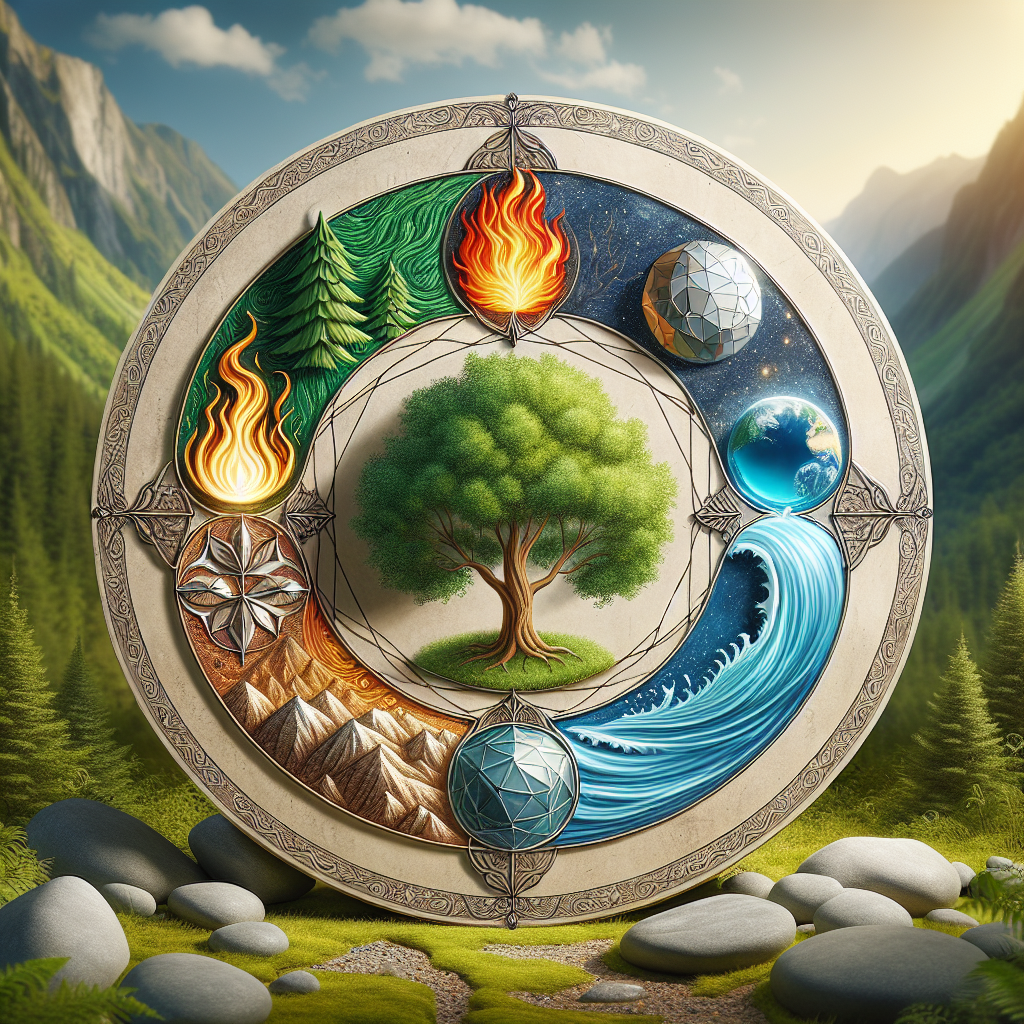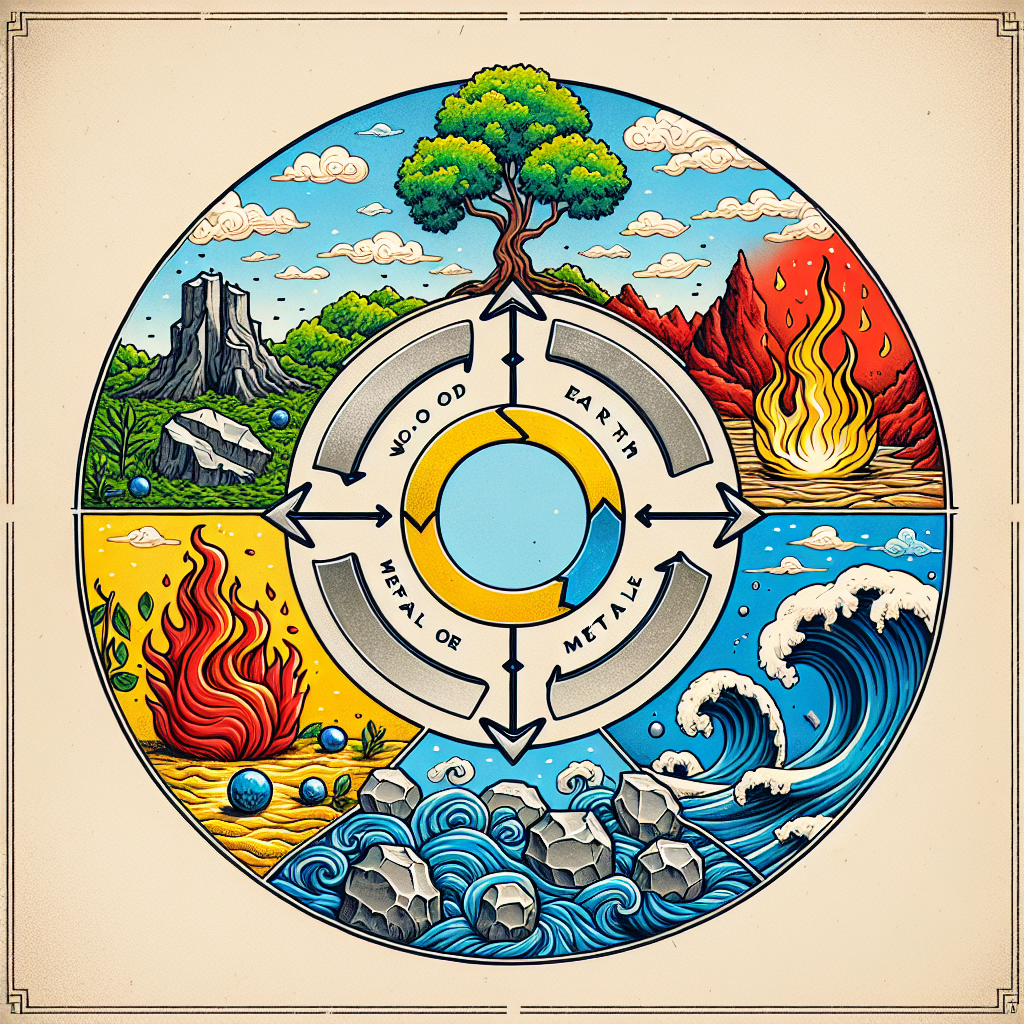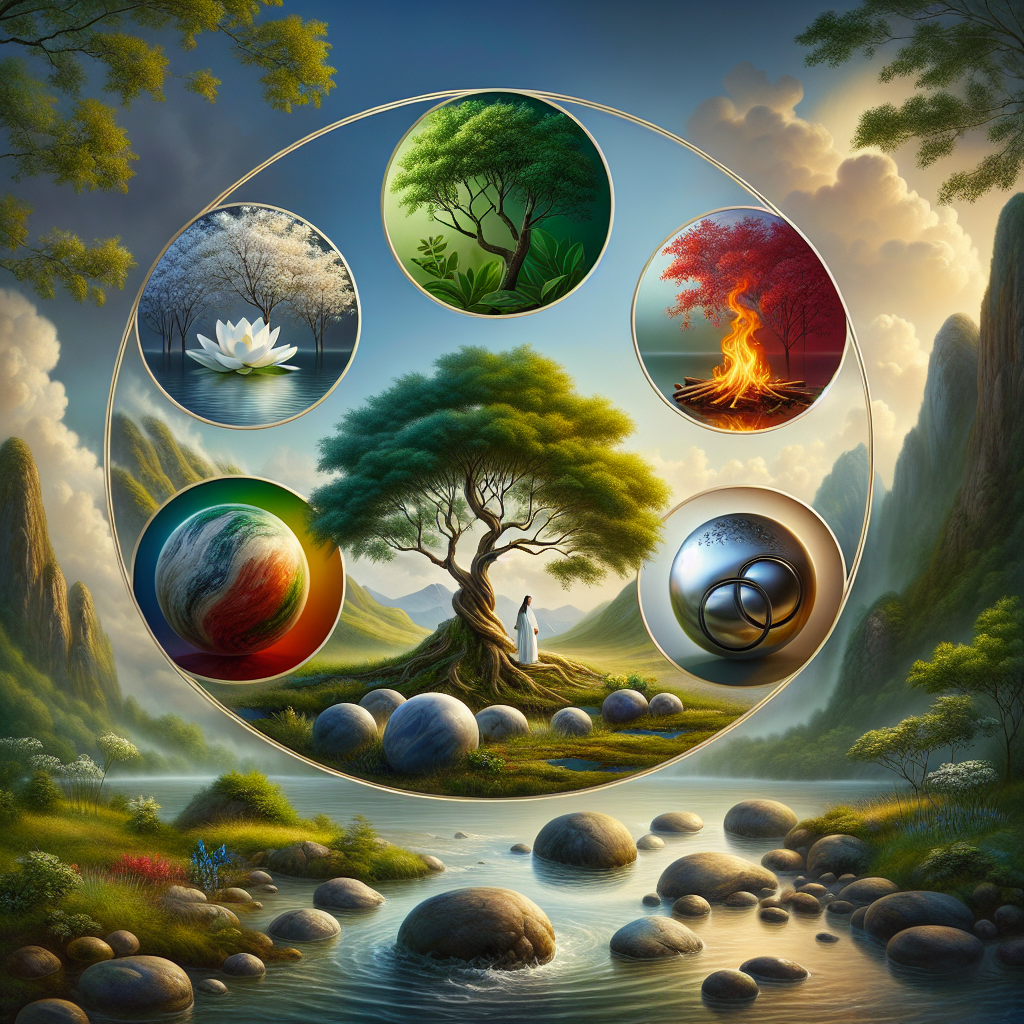Have you ever noticed how your energy shifts with the changing seasons? That spring brings a burst of motivation, while winter makes you want to curl up and rest? There’s a fascinating reason behind these natural rhythms, and it dates back thousands of years to ancient Chinese wisdom.
In Traditional Chinese Medicine (TCM), this phenomenon is explained through Wu Xing Principles, also known as the Five Element Theory. This 2,000-year-old philosophy isn’t just an interesting historical concept – it’s a practical framework that can help us live in harmony with nature’s cycles and improve our overall wellbeing.
Wu Xing Principles view the universe as composed of five fundamental elements: Wood, Fire, Earth, Metal, and Water. These elements aren’t just physical substances but represent energetic qualities that flow through everything – including our bodies and the seasons around us. By understanding these connections, we can adapt our lifestyle to support our health year-round.
“The Wu Xing theory provides a beautiful roadmap for living in tune with nature’s rhythms,” explains Dr. Ming Chen, a TCM practitioner with over 30 years of experience. “When we align our activities and diet with seasonal energies, we create harmony within ourselves and with the world around us.”
Let’s explore how each season connects to a specific element and discover practical ways to thrive throughout the year.
Spring: Embracing the Wood Element
As winter thaws and green shoots emerge from the soil, we enter the season of Wood. In Wu Xing Principles, spring represents new beginnings, growth, and the upward, expansive energy of plants reaching toward the sun. This same energy flows through us, creating the perfect time for setting intentions and starting fresh projects.
The Wood element corresponds to the liver and gallbladder in our bodies. After winter’s stillness, these organs need support as they work to detoxify and process nutrients for our springtime growth. Many people naturally feel drawn to “spring cleaning” – both in their homes and bodies – and this aligns perfectly with Wood energy.
Great springtime activities include:
- Gardening: Getting your hands in the soil connects you directly to the Wood element while cultivating new life. Even growing herbs on a windowsill can channel this energy.
- Morning stretching: Gentle stretches that focus on the sides of the body help support liver function and promote the free flow of qi (energy).
- Planning and visualization: Use spring’s forward-moving energy to map out goals and dreams.
Green foods like spinach, kale, and broccoli naturally support liver function, making them ideal additions to your spring diet. Slightly sour foods like lemon water can also help stimulate liver qi according to Wu Xing Principles.
“Spring is the perfect time to gently cleanse and rejuvenate,” says nutritionist Sarah Wong. “Adding fresh greens and reducing heavy foods helps mirror nature’s own detoxification process.”
Summer: Dancing with the Fire Element
As temperatures rise and days lengthen, we transition into summer – the season of Fire. In Wu Xing Principles, Fire represents maximum expansion, joy, and activity. It’s the season of fullness, brightness, and connection, when nature displays its most vibrant colors and abundant growth.
The Fire element corresponds to the heart and small intestine. During summer, our circulation increases, and we naturally feel more energetic and social. However, too much heat can lead to imbalances like irritability, insomnia, or burnout.
To harmonize with summer’s Fire energy, consider:
- Tai Chi or Qigong: These flowing movements help balance excess heat while connecting mind and body.
- Swimming: Water activities naturally cool Fire’s intensity while still supporting joyful movement.
- Social gatherings: Summer is ideal for connecting with others, reflecting the heart’s role in emotional bonds.
Cooling foods like watermelon, cucumber, and mint help balance summer’s heat, while bitter flavors like leafy greens support heart function. Many people naturally crave salads and lighter meals during this season – your body intuitively knows what it needs!
“In summer, aim for balance between activity and rest,” advises wellness coach David Lin. “The Fire element brings wonderful energy, but without some cooling practices, we can quickly burn out.“
Late Summer: Grounding in the Earth Element
Traditional Chinese Medicine recognizes a fifth season – Late Summer or the harvest season – associated with the Earth element. This transitional period between summer and autumn represents stability, nourishment, and centeredness.
The Earth element governs the spleen and stomach, our primary digestive organs. During this time, we’re processing the abundance of summer and preparing for autumn’s shift inward. Many cultures worldwide celebrate harvest festivals during this period, acknowledging Earth’s nourishing qualities.
To align with Late Summer’s Earth energy:
- Mindful eating: Slowing down and appreciating each bite strengthens digestive function.
- Grounding practices: Walking barefoot on natural surfaces helps you literally reconnect with the earth.
- Creating nurturing routines: Establishing supportive daily habits provides stability during seasonal transitions.
Sweet flavors naturally correspond to the Earth element, but think sweet potatoes and carrots rather than processed sugars. Yellow and orange foods particularly support spleen energy according to Wu Xing Principles.
“The Earth element teaches us about proper nourishment on all levels,” explains TCM practitioner Jennifer Wu. “This season reminds us to digest not just food, but also experiences and information, taking only what truly serves us.“
Autumn: Refining with the Metal Element
As leaves begin to fall and the air crisps, we enter autumn – the season of Metal. In Wu Xing Principles, Metal represents refinement, precision, and letting go. Just as trees release their leaves, autumn invites us to release what no longer serves us and distill what’s truly valuable.
The Metal element corresponds to the lungs and large intestine, both organs involved in taking in what’s necessary and eliminating waste. Many people experience respiratory sensitivity during autumn, reflecting the lungs’ increased vulnerability.
Harmonizing with autumn’s Metal energy includes:
- Breathing exercises: Pranayama or simple deep breathing practices strengthen lung function.
- Decluttering: Clearing physical spaces mirrors the season’s natural letting-go process.
- Journaling: Reflecting on what to release and what to preserve helps refine your life direction.
White foods like pears, radishes, and cauliflower support lung function, while mildly spicy foods help clear stagnation. The slightly dry quality of autumn makes hydration especially important during this season.
“Metal energy helps us recognize what’s precious,” says mindfulness teacher Mark Johnson. “When we practice letting go, we create space for what truly matters, just as a sculptor removes excess stone to reveal the beauty within.”
Winter: Deepening with the Water Element
As nature quiets and life moves underground, we enter winter – the season of Water. In Wu Xing Principles, Water represents stillness, introspection, and potential. Like seeds dormant beneath snow, winter holds the deep reserves of energy that will fuel spring’s growth.
The Water element governs the kidneys and bladder, our organs of filtration and our deepest energy reserves. Traditional Chinese Medicine views the kidneys as particularly important, storing our essential life force or “jing.”
To align with winter’s Water energy:
- Meditation: Quiet contemplation mirrors winter’s stillness while building inner resources.
- Gentle movement: Practices like gentle yoga help maintain circulation without depleting energy.
- Earlier bedtimes: Following the sun’s earlier setting supports your body’s natural rhythms.
Warming foods like soups, stews, and bone broths nourish kidney energy, while small amounts of salty flavors support Water element balance. Root vegetables and dark foods like black beans align with winter’s inward-moving energy. These therapeutic food properties have been valued for millennia.
“Winter teaches us the importance of rest,” notes wellness educator Emily Chen. “In our busy modern world, we often resist slowing down, but winter reminds us that periods of apparent stillness are essential for future growth.”
Navigating Seasonal Transitions with Wu Xing Principles
The Wu Xing Principles shine brightest during seasonal transitions, when our bodies need extra support adapting to changing energies. These shift periods often trigger health challenges when we resist the natural flow.
Mindfulness becomes particularly valuable during transitions. Notice how your energy levels, mood, and appetite shift as seasons change. Rather than fighting these changes, consider how you might adjust your routine to support your body’s wisdom.
Dietary adjustments are perhaps the simplest way to align with seasonal energies. Traditional Chinese Medicine recommends:
- Gradually shifting from cooling foods to warming ones as summer gives way to autumn
- Adding pungent foods like onions and ginger during autumn to support respiratory health
- Incorporating more warming spices as winter approaches
- Introducing bitter greens as winter transitions to spring
- Eating lighter, cooling foods as spring moves toward summer
Physical activities should similarly shift with the seasons. High-intensity workouts that feel invigorating in spring might deplete your energy in winter. The Wu Xing Principles encourage us to match our activity levels to seasonal energies – more expansive in spring and summer, more conservative in autumn and winter.
“The most profound benefit of following Wu Xing Principles is the reconnection with natural cycles,” says holistic health practitioner Susan Park. “In our climate-controlled, artificially lit modern world, we’ve lost touch with seasonal rhythms. Reclaiming this awareness brings a deeper sense of belonging to the natural world.”
Modern Wellness Through Ancient Wisdom
At HerbalsZen, we believe that ancient wisdom like the Wu Xing Principles offers profound insights for modern wellbeing. By understanding these natural cycles, we can make choices that support our health year-round, rather than fighting against nature’s rhythm. Our approach aligns with traditional healing knowledge that has stood the test of time.
Our EASTCHI AI system integrates these time-tested Wu Xing Principles with cutting-edge technology to provide personalized wellness recommendations. By analyzing your constitutional type through Five Element Theory, EASTCHI AI can suggest seasonal dietary adjustments, activity recommendations, and lifestyle practices specifically tailored to your needs.
Unlike one-size-fits-all wellness approaches, EASTCHI AI recognizes that each person’s relationship with the elements is unique. Some of us naturally run “hot” and need more cooling practices, while others need warming support year-round. By identifying these patterns, we can provide truly personalized guidance that evolves with the seasons.
The Wu Xing Principles remind us that health isn’t static – it’s a dynamic dance with nature’s cycles. By embracing these natural rhythms rather than resisting them, we can cultivate resilience, vitality, and harmony throughout the year.
As the seasons change, consider how you might incorporate these ancient principles into your modern life. Whether it’s adjusting your diet, shifting your exercise routine, or simply becoming more mindful of nature’s transitions, small changes aligned with Wu Xing wisdom can yield profound benefits for your wellbeing.
After all, these principles have supported human health for thousands of years – perhaps they hold exactly the wisdom we need to thrive in our fast-paced modern world.




